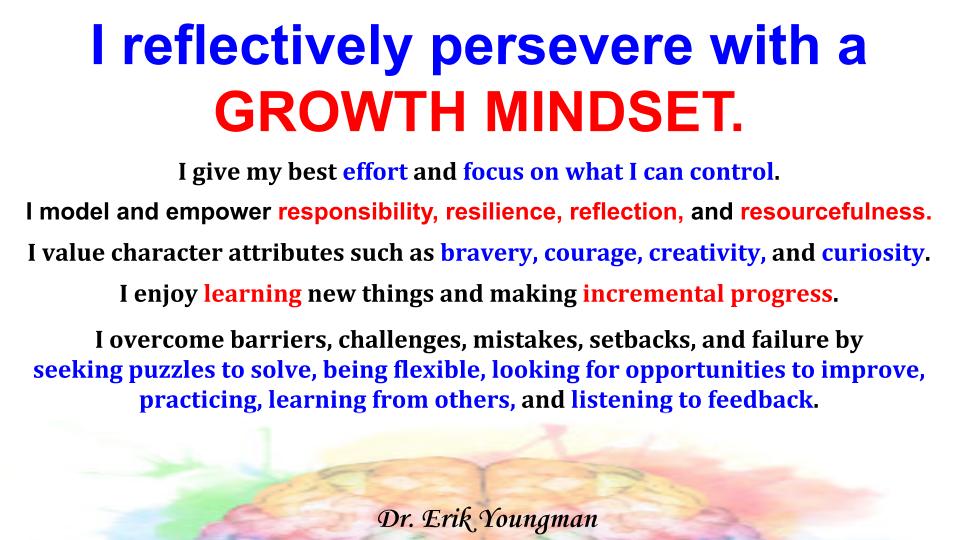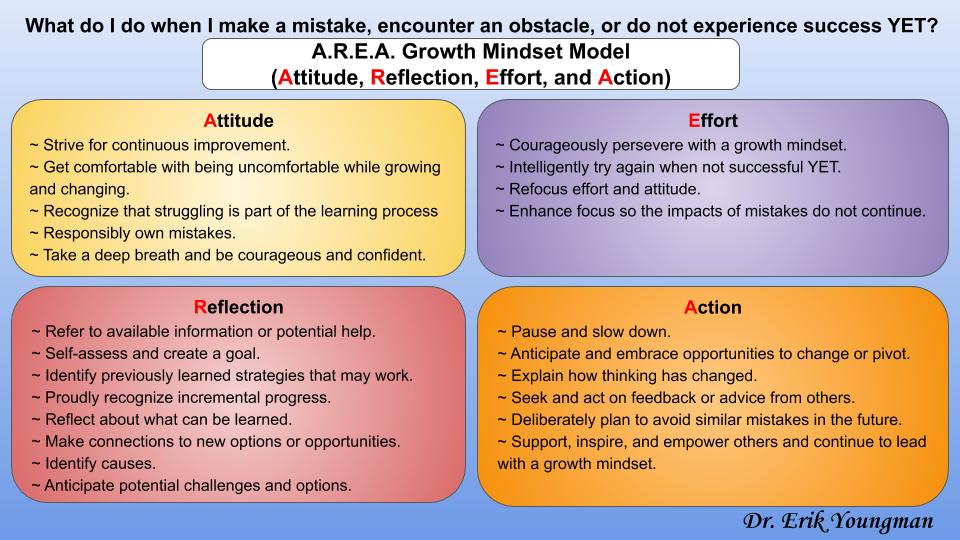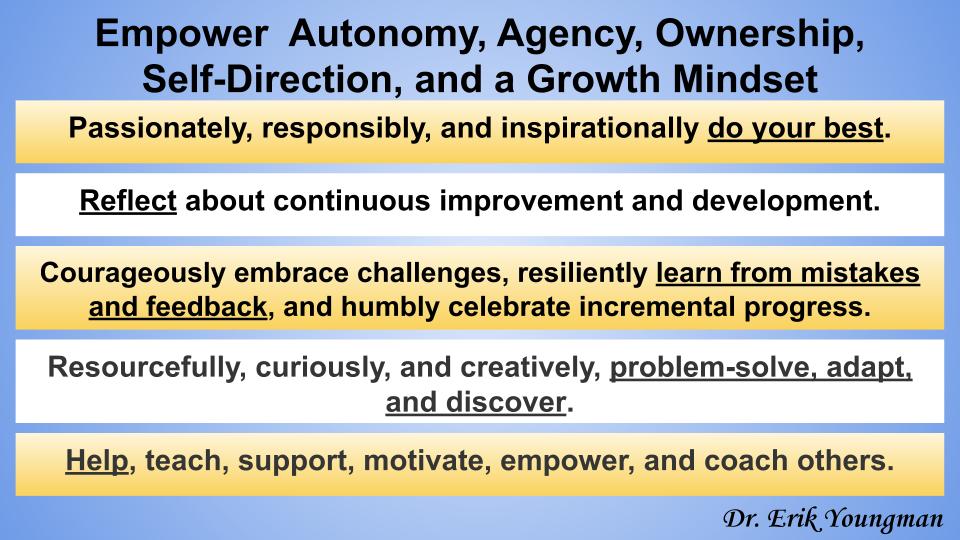TL;DR:
- Use a growth mindset to reflectively persevere.
- Consider the A.R.E.A. (Attitude, Effort, Reflection, Action) Growth Mindset Model when you make a mistake, encounter an obstacle, or haven’t experienced success yet.
- Model how to enhance autonomy, agency, ownership, and self-direction.
- Evaluate continuous learning with a growth mindset matrix.
Modeling and empowering a growth mindset while learning in school is just as important as when learning other skills such as sports, art, music, and riding a bicycle. Regardless if it is a pandemic or not, in the beginning or middle of the school year, inspiring growth mindset behaviors can help learners. However, what does it really mean to have a growth mindset?
Examples of growth mindset can enhance understanding and ultimately increase the likelihood of modeling and empowering beneficial behaviors. Four pertinent questions regarding growth mindset were discussed during recent collaboration, consultation, and planning with fellow educators and leaders.
Questions focused on specific ways that educators can model and empower.
- Reflective persevering with a growth mindset.
- Responding to mistakes.
- Autonomy, agency, ownership, and self-direction.
- Analyzing nine characteristics from a growth mindset matrix.
The growth mindset mantra, model, motivation, and matrix are four helpful tools that can guide discussions and encouragement about the aforementioned questions.
Think about how you will encourage these behaviors and provide scaffolded support so learners can use these skills in a variety of settings and become leaders who help, teach, support, motivate, empower, and coach others. Share on XReflective Perseverance with a Growth Mindset Mantra

Mantras, statements, affirmations, and self-talk can be discussed to train students’ brains to help them better understand how they can think, learn, and act with a growth mindset.
The growth mindset mantra below can help students understand what it means to reflectively persevere with a growth mindset.
I…
- reflectively persevere with a GROWTH MINDSET.
- give my best effort and focus on what I can control.
- model and empower responsibility, resilience, reflection, and resourcefulness.
- value character attributes such as bravery, courage, creativity, and curiosity.
- enjoy learning new things and making incremental progress.
- overcome barriers, challenges, mistakes, setbacks, and failure by seeking puzzles to solve, being flexible, looking for opportunities to improve, practicing, learning from others, and listening to feedback.
What would you add? Which of your students could benefit from reviewing this mantra with you?
A.R.E.A. Growth Mindset Model
Mistakes and obstacles can limit progress and negatively impact mental thoughts. Thus, uncovering attributes that help learners overcome mistakes is worthy of analysis.
What do I do when I make a mistake, encounter an obstacle, or do not experience success YET? Educators, coaches, and leaders can use the “A.R.E.A. Growth Mindset Model” below to empower attitude, reflection, effort, and action to help students react to mistakes, obstacles, or lack of success yet.

Model and empower a growth mindset attitude that strives for continuous improvement, embraces getting comfortable with being uncomfortable while growing and changing, and recognizes that struggling is part of the learning process. Also focus on responsibly owning mistakes, and taking a deep breath while being courageous and confident.
Model and empower growth mindset reflection by referring to available information or potential help, self-assessing and creating a goal, identifying previously learned strategies that may work, and proudly recognizing incremental progress. Focus on reflecting on what can be learned, making connections to new options or opportunities, identifying causes, and anticipating potential challenges and options.
Model and empower a growth mindset effort that courageously perseveres, intelligently tries again when not successful YET, refocuses effort and attitude, and enhances focus so the impact of mistakes do not continue.
Finally, model and empower growth mindset actions. These actions include pausing and slowing down, anticipating and embracing opportunities to change or pivot, and explaining how thinking has changed. Also, focus on seeking and acting on feedback or advice from others. Deliberately plan to avoid similar mistakes in the future. And support, inspire, and empower others while continuing to lead with a growth mindset.
Motivate Autonomy and a Growth Mindset
Educators discuss the benefits of attributes such as autonomy, agency, ownership, and self-direction, but rarely model how to enhance these independent skills. Educators can help their students (during asynchronous learning, homework, independent work, and research), coaches can help their players, and leaders can help their colleagues by supporting the following five areas of focus.
- Passionately, responsibly, and inspirationally doing your best.
- Reflecting on continuous improvement and development.
- Courageously embracing challenges, resiliently learning from mistakes and feedback, and humbly celebrating incremental progress.
- Resourcefully, curiously, and creatively, problem-solving, adapting, and discovering.
- Helping, teaching, supporting, motivating, empowering, and coaching others.
Think about how you will encourage these behaviors and provide scaffolded support so learners can use these skills in a variety of settings and become leaders who help, teach, support, motivate, empower, and coach others.
Continuous Learning with a Growth Mindset Matrix
A final helpful tool that can guide discussions and encouragement facilitates analysis of nine characteristics from a growth mindset matrix. The organization of the matrix is based on Dr. Carol Dweck’s work regarding growth mindset and the Knoster Model for Managing Complex Change. The matrix provides a powerful image that demonstrates the synergy of different growth mindset variables while also exposing and labeling gaps.
As you can see, the impact of nine growth mindset characteristics can be scrutinized to ultimately discuss the benefits of a growth mindset while also recognizing negative short- or long-term impacts when growth mindset characteristics are missing.
Nine characteristics that empower continuous learning with a growth mindset include being resilient, conscientious, a creative problem-solver, optimistic, a continuous improver, inspired, able to learn from failure, appreciative of challenges, and embracing feedback.
There are negative outcomes when any of these nine characteristics are missing. There may be debate regarding the specific negative outcome, however, the words and concepts represented in the matrix should facilitate reflection and conversation regarding growth mindset.

Learners are rigid when they are not resilient, apathetic when they are not conscientious, unsystematic when they are not creative problem-solvers, regress when they are not continuously improving, competitive or indifferent when they are not inspired, repeat mistakes when they do not learn from failure, are discouraged when they do not appreciate challenges, are pessimistic when they are not optimistic, and are stagnant when they do not embrace feedback.
However, when all nine of these characteristics are utilized, learners can continuously learn with a growth mindset, which should be a goal for all of us.
[scroll down to keep reading]
Conclusion
One could argue that during a pandemic, growth mindset skills are even more critical as students learn independently more frequently during asynchronous learning. Please continue to learn about growth mindset so you can model and empower a growth mindset as you purposely or inadvertently shape the minds of learners to help them become future leaders.
Which growth mindset mantra, model, motivation, or matrix will you use first? What am I missing here? How are you doing this in your school? I would love to hear feedback and questions via Twitter (@Erik_Youngman) so we can collaboratively discuss, model, and empower a growth mindset.
About Erik Youngman
Erik Youngman is an education leader who is passionate about topics such as homework, grading, leadership, and growth mindset. He recently completed his nineteenth year in educational leadership. Erik is the Director of Curriculum, Instruction, and Assessment for Libertyville District 70 in Libertyville, Illinois. Previous education experiences include being a principal in Libertyville as well as an assistant principal and teacher in Gurnee, Illinois.
Erik earned a Doctorate in Educational Leadership, Education Specialist Degree, and Master of Science in Education from Northern Illinois University and a Bachelor of Arts from Augustana College. Please follow and contact Erik via Twitter: @Erik_Youngman.


